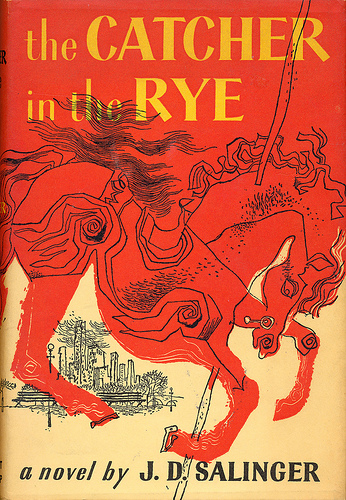It’s the last Sunday of the year, so you know what that means. Either I’m getting stingier or this year hasn’t been the best reading year for me—while last year’s year in review post was agonizing to curate, I did this year’s in a few hours. Hopefully, 2013 will ring in a higher batting average for my reading. But it’s not that I haven’t enjoyed my reading this year; I definitely have, especially my nonfiction reading—I mean, I discovered Tom Wolfe this year, so that is a definite plus. As ever, this list is culled from what I read in 2012, not what was released in 2012 (although I read more recent titles this year than in past years).
Continue reading
j. d. salinger
The Sunday Salon: Bookish Questions
I can’t tell you how happy I am it’s December. Sure, finals season is upon me, but I always get antsy on the last one or two days of a month. I like having a fresh calendar and new wallpapers. But November still lingers, in the best of ways: last month, Lu tagged me with a short reading questionnaire. Why don’t we get started?
Review: The Catcher in the Rye
The Catcher in the Rye by J. D. Salinger
![]()
![]()
![]()
![]()
![]()

I never read anything at the right time. This not only applies to seasonal reads, but generational reads. During a recent A. V. Club binge, I came across a Q & A post where contributors talked about what they would make required reading to graduate from high school. Among them was The Catcher in the Rye, which I have managed to completely miss. (That’s not too surprising; I’ve managed to completely miss The Wizard of Oz. Now I’m just holding onto that out of sheer stubbornness.) I have a hard time relating to teenage protagonists, but, for some reason, I found myself wandering the fiction shelves at the library and automatically taking it home. It’s not the usual time, perhaps, but it’s the right time for me.
The Sunday Salon: What Makes YA YA?
Remember last summer, when NPR hosted that poll about the best science fiction and fantasy novels? Well, this summer NPR had another poll—this one aimed at generating the best ever teen novels, according to NPR listeners. While I rushed to last summer’s, if only to fulfill my obligations as a Tolkien fanatic and devotee of Jacqueline Carey, I didn’t to this one. Why? Because of the rather thin criteria. Whereas last summer’s poll focused on two genres that, at the very least, can be defined in broad strokes, this poll focuses on an audience instead—an audience we’ve only recently invented, and have only recently started catering to.
